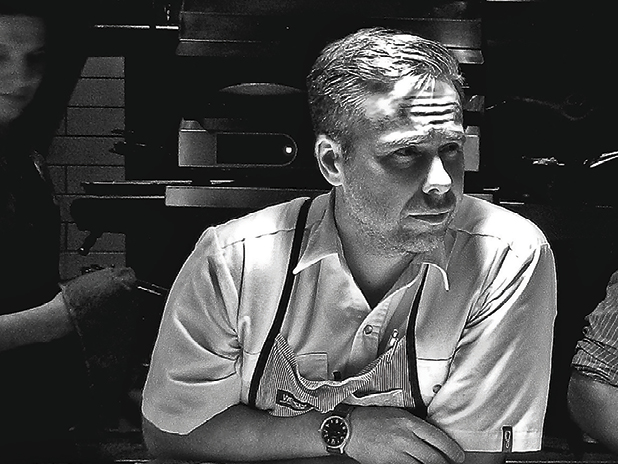Why Our New Food Columnist Hates Instagram
Last fall I went to Copenhagen to stage in one of Europe’s most respected restaurants, Relæ. I was 41, almost twice as old as the other stages, and an established chef back home. I had a successful restaurant, and I was about to open another, a wine bar called Pigeonhole. And I was standing in an unfamiliar kitchen beside a couple of 20-year-olds, about to break my back washing two kilos of Polish mushrooms. The task was simple: with the tip of a small turning knife, clean any debris, twigs, tree needles, or sand from the chanterelles, then plunge them in a clean bowl of water, agitate, remove and, using the knife, clean or remove anything that hadn’t come off. Turns out those forests in Poland are home to all the missing sand from the shrinking Sahara Desert. Twelve kilos and nine hours later, my back was killing me. My knees were throbbing. I longed for Ibuprofen. I wanted to stick that turning knife in my eyes. What was I doing here?
No amount of Instagramming will make something taste better if it sucks to begin with.
I was hunched over that pot of mushrooms for some much-needed reinvigoration — to see if I still had the same drive, the same passion, the same curiosity I had when I was starting out. I needed those things if I was going to open a new place. A chef works for 20 or 30 years honing their craft, ceaselessly pursuing some elusive notion of perfection. A stage — a French tradition of chefs and cooks working for free in other kitchens to expand their knowledge and skills — is an opportunity to scratch around in their ever-expanding world and unearth as much as they can. The idea is to gain confidence as you realize you can still be tested, and still measure up. After all, running a successful kitchen is about far more than just artfully arranging food on a plate. No amount of Instagramming, or reputation for that matter, will make something taste better if it sucks to begin with.
My first stage was over 20 years ago when I was a kid who’d never been to New York City. I’d never eaten at a restaurant like Daniel Boulud’s Daniel or Thomas Keller’s The French Laundry, let alone worked in a kitchen of that caliber. I ended up staging at both in quick succession. It was tough. Halfway in, my long-time girlfriend moved out. Despite the hours, the stress, the exceptionally tedious lengths that were taken to refine and finesse an ingredient, I finished it.
These stages helped form how I look at kitchens, food, and cooks — and my life as a whole. The truth is, there is no magic secret to great food. It all comes down to product, discipline, know-how and extremely hard work. For all of these experiences, I never received a cent. I lived off savings, woke up for 5 a.m. start times, spent hours repeating the same task, and rewarded myself with bottle after bottle of Ibuprofen. Sometimes, numbly, I’d question my life choices.
This industry is filled with chefs looking for a shortcut. I couldn’t open a restaurant if I wasn’t dedicated to putting in the work to make it perfect. I’m unwilling to use the smoke and mirrors of social media, or PR dollars to prop up my reputation. So I did what I’ve always done. I got myself into a famous kitchen as a stage, I put my head down and went to work on those mushrooms.
At the end of my stage in Copenhagen, I dined at the restaurant. That chanterelle dessert? It was worth all the self-doubt.
Justin Leboe is the chef/owner at Model Milk, Calgary’s best (there, we said it: best) restaurant, and the recently opened Pigeonhole. Look for his regular column on food and restaurants in every issue of SHARP.










